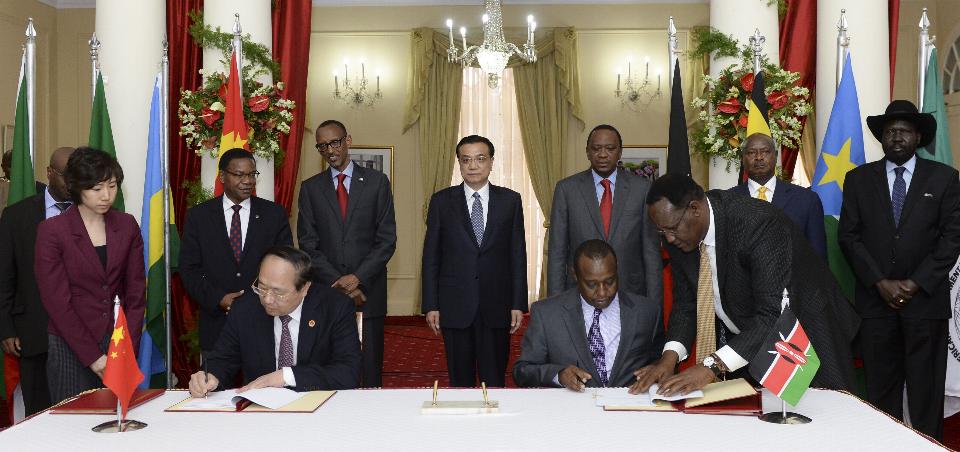Addis Ababa (HAN) May 22, 2041. This opinion paper By By Frank Ching. Africa’s natural resources can be more easily exported to China if infrastructure is modernized. But, in the long term, Africa itself is likely to be the biggest beneficiary of such modernization; according to Prime Minister of Ethiopia.
According to the Geeska Afrika Online security and energy reporter about Chines eye on Africa and Russia in East: China the world’s largest oil importer, and Russia, a key energy exporter, are economically complementary. Soon after li’s arrival in Moscow, the two countries pledged to cooperate in the fields of oil, natural gas, coal, electricity and new energy.
Strategic Trip to Africa, according to Frank Ching: Chinese leader Li Keqiang made headlines during his eight-day trip to Africa, which he started in Ethiopa by promising that China would increase aid to the Africa by US$12 billion and predicting that bilateral trade would double to US$400 billion and cumulative Chinese investment quadruple to US$100 billion by 2020.
He also pledged in a speech to the World Economic Forum in Nigeria that China would help to connect cities across the continent by road, by air and very much by rail. This is likely to have great significance for Africa’s long-term development since the lack of transportation infrastructure is a severe impediment to growth.
He said in his speech that Africa covers 23 per cent of the world’s land area but only accounts for seven per cent of world railways, with 13 countries having no railways at all.
The Infrastructure Consortium for Africa, created by the G8 in 2005, estimates that poor roads, railways and harbors add 30 to 40 per cent to the cost of goods traded among African countries.
According to Deloitte, which provides financial services in 150 countries, lack of infrastructure has resulted in a low level of trade. Africa, it said, accounts for 12 per cent of the world population but generates only one per cent of global GDP and only two per cent of world trade.
So, a coordinated effort to upgrade the continent’s transportation infrastructure is very much welcomed, not only by Africans but by all countries that trade with them, since it will lower costs and shorten delivery times. A signing ceremony for a US$3.6 billion-railway linking Nairobi, the Kenyan capital, to the port of Mombasa, a distance of slightly more than 600 km, was held on May 11 during Li’s visit to Kenya.
At a news conference, Kenyan President Uhuru Kenyatta said that after completion of the project, “the costs of moving our people and our goods across our borders will fall sharply”. Freight costs may drop by 60 per cent. Work on what is known as the Standard Gauge Railway is scheduled to begin Oct 1, China’s national day, and take 42 months to complete.
The agreement was signed by Li Ruogu, president of China Exim Bank, which will provide 90 per cent of the financing, and Henry Rotich, treasury secretary of Kenya, which will be responsible for the remaining 10 per cent. But the significance of the accord goes well beyond Kenya.
This was reflected in the presence at the signing ceremony of the presidents of Uganda, Rwanda and South Sudan, as well as a minister from Burundi, since the Nairobi-Mombasa rail line represents only the first phase of a project that is meant to serve those countries as well. Completion is tentatively scheduled for 2020 but financing for the overall project, which will cost many billions more, has not been finalized although a memorandum of understanding between several East African countries and the African Development Bank on project funding has been signed.
A statement by the Kenyan government said in part: “The Standard Gauge Railway project inaugurates a new phase in East Africa’s transport history. “It offers the prospect of efficient, reliable and inexpensive rail transport for both passengers and freight on a previously unprecedented scale.”
The rail links, when completed, will cover about 3,200 km of track and are expected to dramatically enhance the position of Kenya and other East African countries as a regional economic hub.
The plan is that the rail line will eventually serve Kampala, the Ugandan capital, Kigali, the capital city of Rwanda, and Bujumbura, the capital of Burundi, with a branch to Juba, in South Sudan, Africa’s newest country.
The Chinese premier, cognizant of African criticism of Chinese behavior, asserted that Chinese firms would be required to transfer skills to local workers and would abide by local rules and respect local customs. This project, while ambitious, is but one of many with which China is involved in Africa.
This month, China Railway Construction Corporation also signed a US$13.1 billion agreement to build a high-speed railway in Nigeria, another country on the premier’s itinerary, the China Daily reported.
China is by no means the only party involved in funding railway infrastructure in Africa. The World Bank has approved US$300 million for railway infrastructure in Tanzania. China’s support for transportation infrastructure in Africa is to be applauded even as oil and minerals continue to be among its major interests.
After all, Africa’s natural resources can be more easily exported to China if infrastructure is modernized. But, in the long term, Africa itself is likely to be the biggest beneficiary of such modernization. Sources: Frank Ching,New Straits Times. Frank.ching@gmail.com
The latest updates Follow twitter.com/GeskaAfrika
Geeska Afrika Online (1985 -2014) – The International Gateway news and views about the Horn of Africa (Ethiopia, Eritrea, Somalia, Somaliland, Sudan, South Sudan, Djibouti, Kenya and Uganda), the best IGAD news and information Online Site for the last 20 Years.
–
HAN & Geeska Afrika Online (1985-2014), the oldest free independent Free Press in the region, brings together top journalists from across the Horn of Africa. Including Ethiopia, Somalia, Eritrea, Sudan, Djibouti, South Sudan, Uganda, Kenya, Oromo, Amhara, Somali, Afar and Harari. Plus, we have daily translations from 150 major news organizations in the Middle East and East African regions. Contact at news@geeskaafrika.com


Leave a Reply